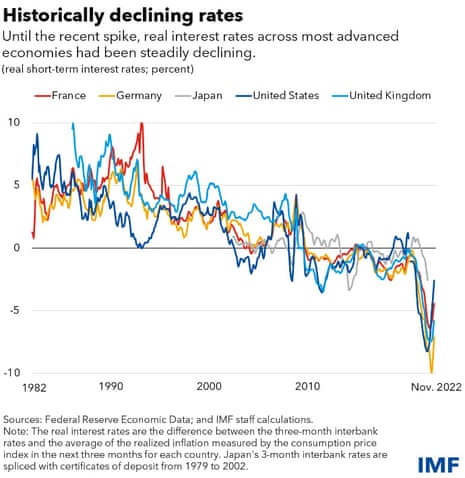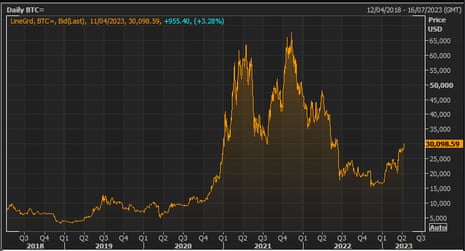Introduction: interest rates likely to return towards pre-Covid levels, says IMF
Good morning, and welcome to our rolling coverage of business, the financial markets and the world economy.
Interest rates are set to fall back to levels seen before the outbreak of Covid-19 once inflation has been tamed.
That’s the message from the International Monetary Fund this morning, as top economists and central bankers head to Washington DC for its Spring meeting.
A team of IMF economists have examined the ‘natural rate of interest’ – the interest rate which keeps inflation on target while neither stimulating nor hampering economic growth.
Their conclusion: the recent increases in real interest rates are “likely to be temporary”, due to factors such as sluggish productivity growth and aging populations.

They predict the natural rates in advanced economies “will likely remain low”, while those in emerging markets are likely to drop towards those levels.
That would mean interest rates would fall towards the lows seen in the pandemic. In the UK, interest rates were cut from 0.75% to just 0.1% in early 2020 (they’re currently 4.25%).
The IMF say:
When inflation is brought back under control, advanced economies’ central banks are likely to ease monetary policy and bring real interest rates back towards pre-pandemic levels. How close to those levels will depend on whether alternative scenarios involving persistently higher government debt and deficits, or financial fragmentation materialize.
In large emerging markets, conservative projections of future demographic and productivity trends suggest a gradual convergence towards advanced economies’ real interest rates.
The natural rate is an important anchor for monetary policy, as central bankers try to set interest rates to keep rising prices in check without driving people out of work.
So if the IMF are right, it’s a boost for borrowers such as households struggling with mortgage payments. But, it would suggest central bankers could be left with less firepower to fight the next downturn, if major economies are saddled with chronically weak productivity and smaller workforces due to demographic changes.
The work is part of the IMF’s latest World Economic Outlook, which will be released later today. The Fund will also release a new Global Financial Stability Report as part of its annual spring meetings with the World Bank in Washington.
Kristalina Georgieva, the IMF’s managing director, warned last week that the global economy is heading for the weakest period of growth since 1990, as the surge in interest rates to fight inflation hits the global economy.
The agenda
-
9am BST: China’s new yuan loans for March
-
10am BST: Eurozone retail sales for February
-
11am BST: NFIB index of small US business optimism
-
2pm BST: IMF publishes latest World Economic Outlook
-
3.30pm BST: IMF publishes latest Global Financial Stability Report
Key events
Full story: CBI dismisses director general Tony Danker after conduct complaints

Joanna Partridge
Tony Danker, the boss of the Confederation of British Industry, has been dismissed with immediate effect after an investigation into complaints about his conduct in the workplace.
The CBI hired a law firm to investigate him after the Guardian approached the business group about a formal complaint that was made in January, as well a number of alleged informal reports of concerns over his behaviour.
The business lobby group said it wanted to make clear that Danker was not the subject of other complaints recently reported by the Guardian. Those other claims by more than a dozen women allege various forms of sexual misconduct by senior figures at the organisation.
However, the board of the CBI added they had determined that Danker’s conduct “fell short of that expected of the director general”.
The CBI’s plight is a warning to other UK organisations, and an opportunity to look at their own internal culture, writes journalist and broadcaster Josie Cox today.
She says the allegations of misconduct at the business lobbying group are another reminder that wherever there is money there is power… and that “where there is power, abuse – in some form – is frequently still rife”.
Cox explains:
Despite ostensible efforts by some of Britain’s biggest companies to create equal opportunities and appropriate representation for all genders and races within the workplace, businesses remain stubbornly skewed.
They’re predominantly led by white men and blighted by the pay gap and the authority gap, in which women find it more difficult to be taken seriously at work.
As a function of these chasms, troubling power dynamics allow for cultures of sexism and, in some cases, toxic masculinity to prevail.
More here:
Brian McBride, CBI President, says:
Rain is well-known and highly respected at the CBI, and by its membership. She is the right leader for the organisation, possessing deep knowledge of the challenges facing businesses who are trying to grow in these challenging economic times.
I have every confidence that she will provide the clear-sighted leadership that the CBI and UK business needs.”
Newton-Smith pledges to lead CBI through ‘challenging time’
Rain Newton-Smith, the CBI’s new director-general, is rejoining the business group from Barclays, where she recently became managing director for Strategy and Policy, Sustainability and ESG at Barclays.
Newton-Smith, who worked as the CBI’s chief economist from summer 2014 until this March, says:
“It’s a huge privilege to be asked to return to the CBI to serve as its Director-General. I passionately believe in the power of business to transform our society. I want the CBI to be an organisation of which we can all be proud. I am grateful and determined to lead the team through this challenging time.
I look forward to working with the team, our members and stakeholders as we work together to achieve sustainable growth.”
Danker fired as CBI chief
Tony Danker, the head of the boss of the Confederation of British Industry, has been fired after an investigation into his conduct.
The board of the CBI has announced that Danker had been dismissed with immediate effect following the independent investigation into specific complaints of workplace misconduct against him.
He will be replaced by Rain Newton-Smith, a former CBI chief economist.
The business group’s board says:
The Board wishes to make clear he is not the subject of any of the more recent allegations in The Guardian but has determined that his own conduct fell short of that expected of the Director General.
The CBI adds that three other CBI employees are now suspended pending further investigation into a number of ongoing allegations.
Danker stepped aside as CBI chief in early March, after the Guardian approached the CBI about a formal complaint about his conduct that had been made in January.
Earlier this month, we reported that more than a dozen women have claimed to have been victims of various forms of sexual misconduct by senior figures at the Confederation of British Industry, including one who alleges she was raped at a staff party on a boat on the River Thames.
The CBI says it is liaising with the police and has made clear its intention to cooperate fully with any police investigations.
The CBI’s board says today:
The allegations that have been made over recent weeks about the CBI have been devastating. While investigations continue into a number of these, it is already clear to all of us that there have been serious failings in how we have acted as an organisation. We must do better, and we must be better.
We apologise to the victims of this organisational failure, including those impacted by the revulsion we have all felt at hearing their stories. Nobody should feel unsafe in their workplace
Shipping costs are continuing to ease, which should help to pull down inflation and lead to lower interest rates:
Container spot rates from China to the US West Coast have dropped to the lowest point in the history of the Freightos – Baltic Index (2016). Earlier this month, they dropped below $1000 to $990 (now $1007).
Rates are down 94% YoY. pic.twitter.com/Kagh854FAP
— Craig Fuller 🛩🚛🚂⚓️ (@FreightAlley) April 11, 2023
The recent banking crisis, and expectations that interest rates could soon peak, has spurred demand for cryptocurrencies such as Bitcoin, reports Victoria Scholar, head of investment at interactive investor.
That’s squeezing investors who had bet against Bitcoin, she reports:
“Bitcoin surpassed the psychological resistance level, $30,000 for the first time since June as the 2023 crypto rally continues. Bitcoin is up 80% against the US dollar so far this year but remains sharply below the peak from the final quarter of 2021.
Turmoil in the banking sector and speculation that the Fed could be nearing the peak of the rate hiking cycle have bolstered demand for cryptos, helping bitcoin stage a recovery after it logged a more than 60% slide last year, its second-worse annual performance on record. There is growing speculation that bitcoin is at the start of another bull run. Shorts have been getting squeezed this year, prompting more buying as the bears rush to cover their losing positions.”
Bitcoin hits $30,000, first time since June 2022
Bitcoin has hit a 10-month high this morning, as the crypto currency continues to rally.
Bitcoin has climbed to above $30,000 for the first time since last June, which is almost double the lows hit hit last autumn.
However, it’s still over 50% below the record highs set in November 2021, before sliding through 2022.

Naeem Aslam, chief investment officer at Zaye Capital Markets, predicts the rally will continue, saying:
Bitcoin’s crypto winter is finally gone today, as the price has broken above a critical barrier level of $30,000. Bitcoin has already recovered about half of its losses from its all-time high, and it is up more than 100% from the crypto winter lows.
The present price pattern is expected to generate a lot of attention, as well as FOMO among investors, many of whom have already missed out as the price has regained its significant losses. Yet, we do feel that the moment has come to be a strategic investor in cryptocurrency, since we believe that the path of least resistance for Bitcoin is skewed to the upside and that the present surge is simply the beginning of what is to come.
Bill Blain, market strategist at Shard Capital, says he doesn’t have faith in crypto, citing its “zero legal utility”, regulatory vulnerability, and instability.
But, Blain writes, other traders who bought into bitcoin at the start of the year are sitting on profits, having concluded it was cheap at the start of the year.
I had my moment of market epiphany Sunday afternoon on the sailing club deck…. A chum told me he’s nearly doubled his money buying Bitcoin since buying in January at £13.75k and its now trading around £24.3k – he’s going to hold (“Hodl”) his sizeable bottom-fished position, confident it’s going to hit a new record high this year – at which point he will buy a new car. Nice.
Another sailing mate then told me he follows the candle charts, and reckons there are some seriously bullish signals revealed by “Bollinger Band” analysis of the Bitcoin price action – it’s going to break higher he confidently told me. Neither is a professional investor; they are smart guys watching the markets, looking to make some money. They know its going higher!
FTSE 100 hits one-month high
European stock markets have opened higher today, as traders digest the IMF’s forecast that interest rates will fall back.
In London, the FTSE 100 index has jumped by 54 points, or 0.7%, to 7795 points, its highest level in over four weeks, as trading resumes after the Easter break.
Investors are also cheered by the fall in China’s inflation, and factory prices, overnight.

Mark Sweney
UK consumers cut back on groceries, clothes shopping and eating out last month but streaming and pay TV subscriptions jumped as cash-conscious viewers switched to nights in.
The return of big hit series such as Succession, The Mandalorian and Ted Lasso fuelled a healthy 4.1% increase in spend on digital content and subscriptions in March, the highest year-on-year rise in five months, according to Barclays’ regular snapshot of consumer credit and debit card use.
However, consumers seeking to balance household budgets cut back going out to restaurants, which resulted in monthly spend falling 5.6%, while spend in clothing stores fell 3.4% – the sharpest drop in six months.
Here’s the full story:
Data from China overnight shows that its inflation rate has hit an 18-month low.
China’s consumer price index rose by just 0.7% in the year to March, the slowest pace since September 2021, the National Bureau of Statistics (NBS) said. That’s a slowdown on February’s 1% increase, and weaker than the 1.0% rise forecast by economists.
China’s factories continued to cut prices too, which could lead to lower prices worldwide. The producer price index (PPI) fell 2.5% year-on-year, the fastest pace since June 2020, accelerating from the 1.4% drop seen in February.
Stephen Innes, managing partner at SPI Asset Management, says the data shows China’s recovery is losing steam after pandemic restrictions were lifted.
Chinese consumer inflation read weaker than expected in March, while producer price inflation contracted steadily amid growing signs that a post-COVID economic recovery in the country, especially in the manufacturing sector, was losing steam.
With PPI falling, simply connect the dots as the data speaks loud and clear that consumer spending is still struggling to pick up.
Why the IMF might be wrong
Not all economists agree with the IMF’s view that the natural rate of interest will fall back to pre-Covid levels, once the inflation shock has abated.
Former US Treasury Secretary Lawrence Summers has predicted that rates will be substantially higher on average in the years ahead.
Last month, Summers suggested the real neutral rate might be in the range of 1.5% to 2% going forward. He believes that increased government borrowing, partly to fund defense spending, will keep borrowing costs higher.
Indeed, the IMF’s team of economists agrees there are a few reasons why its assumptions could be wrong.
For example, they say, government support may be difficult to withdraw, increasing public debt. Second, the costs of the green energy transition could also push up deficits. Thirdly, “deglobalization forces could intensify”, leading to both trade and financial fragmentation and pushing up the cost of borrowing.
World Bank chief raises 2023 global growth outlook slightly,
The head of the World Bank has revealed that it has lifted its growth forecast for this year.
World Bank Group President David Malpass said on Monday that the lender has revised its 2023 global growth outlook slightly upward to 2% from a January forecast of 1.7% but the slowdown from stronger 2022 growth will increase debt distress for developing countries.
Malpass told a media briefing that the upward revision was due to an improved outlook for China’s recovery from COVID-19 lockdowns, with growth now pegged at 5.1% this year compared to 4.3% in the bank’s January Global Economic Prospects report.
Advanced economies, including the U.S. and in Europe, are also doing a bit better than the World Bank anticipated in January, Malpass said as the World Bank’s and International Monetary Fund’s Spring Meetings week kicked off.
While this is a growth upgrade for this year, it’s still weaker than the 3% growth which the World Bank expected nine months ago.
Malpass also warned that the recent turmoil in the banking sector and higher oil prices could weigh on growth prospects in the second half of this year.
Introduction: interest rates likely to return towards pre-Covid levels, says IMF
Good morning, and welcome to our rolling coverage of business, the financial markets and the world economy.
Interest rates are set to fall back to levels seen before the outbreak of Covid-19 once inflation has been tamed.
That’s the message from the International Monetary Fund this morning, as top economists and central bankers head to Washington DC for its Spring meeting.
A team of IMF economists have examined the ‘natural rate of interest’ – the interest rate which keeps inflation on target while neither stimulating nor hampering economic growth.
Their conclusion: the recent increases in real interest rates are “likely to be temporary”, due to factors such as sluggish productivity growth and aging populations.

They predict the natural rates in advanced economies “will likely remain low”, while those in emerging markets are likely to drop towards those levels.
That would mean interest rates would fall towards the lows seen in the pandemic. In the UK, interest rates were cut from 0.75% to just 0.1% in early 2020 (they’re currently 4.25%).
The IMF say:
When inflation is brought back under control, advanced economies’ central banks are likely to ease monetary policy and bring real interest rates back towards pre-pandemic levels. How close to those levels will depend on whether alternative scenarios involving persistently higher government debt and deficits, or financial fragmentation materialize.
In large emerging markets, conservative projections of future demographic and productivity trends suggest a gradual convergence towards advanced economies’ real interest rates.
The natural rate is an important anchor for monetary policy, as central bankers try to set interest rates to keep rising prices in check without driving people out of work.
So if the IMF are right, it’s a boost for borrowers such as households struggling with mortgage payments. But, it would suggest central bankers could be left with less firepower to fight the next downturn, if major economies are saddled with chronically weak productivity and smaller workforces due to demographic changes.
The work is part of the IMF’s latest World Economic Outlook, which will be released later today. The Fund will also release a new Global Financial Stability Report as part of its annual spring meetings with the World Bank in Washington.
Kristalina Georgieva, the IMF’s managing director, warned last week that the global economy is heading for the weakest period of growth since 1990, as the surge in interest rates to fight inflation hits the global economy.
The agenda
-
9am BST: China’s new yuan loans for March
-
10am BST: Eurozone retail sales for February
-
11am BST: NFIB index of small US business optimism
-
2pm BST: IMF publishes latest World Economic Outlook
-
3.30pm BST: IMF publishes latest Global Financial Stability Report











